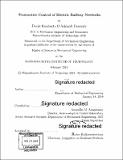Transactive control of electric railway networks
Author(s)
D'Achiardi Pascualy, David Humberto.
Download1102320475-MIT.pdf (10.87Mb)
Other Contributors
Massachusetts Institute of Technology. Department of Mechanical Engineering.
Advisor
Anuradha M. Annaswamy.
Terms of use
Metadata
Show full item recordAbstract
This thesis proposes a transactive control mechanism that minimizes the operational costs of individual trains and integrates rail-side distributed energy resources (DERs) within an electric railway system. The operation of each individual train is posed as an energy cost minimization problem that is constrained by both the dynamics of the train and the specific schedule it must meet. The solution of this problem yields an optimal power profile for the train to follow. For each of the railway's segments, the proposed transactive controller determines the minimum average cost of electricity and the dispatch of the DERs based on the energy usage of the trains across space and time. By iterating between the transactive controller and the cost minimization scheme of the individual trains, the proposed methodology yields optimal power profiles of all the trains in the system and the dispatch of the generation assets. This methodology is tested through numerical simulation of the Amtrak Northeast Corridor service between University Park Station in the outskirts of Boston, Massachusetts and New Haven Station in Connecticut. Simulations of the southbound service over the course of a year demonstrate that the minimum cost operation reduces retail energy supply and delivery charges by 10% when compared to minimum work operation. We test the addition of solar generation across the system as an example of DER integration. The price signal of the transactive controller converges to within 1% after just 3 iterations for a single PV array and one train and within 4 iterations for two PV arrays and two trains.
Description
Thesis: S.M., Massachusetts Institute of Technology, Department of Mechanical Engineering, 2019 Cataloged from PDF version of thesis. Includes bibliographical references (pages 63-66).
Date issued
2019Department
Massachusetts Institute of Technology. Department of Mechanical EngineeringPublisher
Massachusetts Institute of Technology
Keywords
Mechanical Engineering.